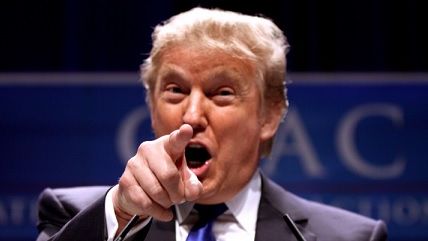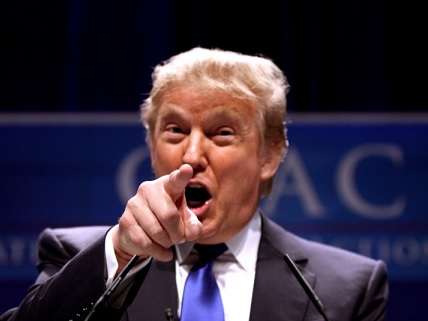One Year Ago Today, Donald Trump Announced He Was Running For President
Now he's the presumptive Republican nominee who's carved out a place in American history, win or lose


A year ago today, real estate mogul/reality TV star Donald Trump announced he was running for president. To varying degrees, Trump had been mentioned as a possible presidential candidate on and off since the 1988 election cycle, the first time he said he was considering a run. In 2000, he went through some of the motions of trying to secure the Reform party nomination (its candidate would receive federal matching funds thanks to Ross Perot's performance in 1996), using Pat Buchanan's entry into the party as his excuse. Trump was friends with Jesse Ventura, then the Reform governor of Minnesota, who had urged him to run. Trump called Buchanan, a paleoconservative, "pre-historic" and called him a "Hitler lover" for arguing against U.S. intervention in World War II. When he dropped out of the race, he blamed Buchanan and the kind of people he was attracting to the Reform party. Today, neo-Nazis represent one of the constituencies in the Trump coalition and are among his loudest supporters outline.
The Trump trajectory did not seem obvious to everyone a year ago, to say the least. Many did not think Trump would run in the first place. After all there was the 2000 campaign, and Trump also speculated he'd run in 2004 as well as in 2012, when he topped a few early GOP primary polls. He became a darling in some quarters of the GOP base for being the highest-profile public personality to embrace birtherism, saying he had sent a team of investigators to Hawaii, Obama's place of birth, and taking credit for the president releasing a long-form birth certificate in the summer of 2012. One point against him running is that some commentators did not believe he would make the financial disclosures necessary to run for president. A year ago today he did, although he has yet to release his tax returns.
Some people welcomed Trump into the race a year ago, and not just the anti-immigration crowd in the Republican base who came around to Mitt Romney in 2012 only after he promised to get millions of illegal immigrants to self-deport. Democrats welcomed Trump into the race too. Bill Clinton, to whose foundation Trump donated, and who attended Trump's most recent wedding, said at the time that Trump had been "uncommonly nice to Hillary and me." That's changed. Trump has made Clinton's sexual history as president one of his lines of attack in his campaign, calling Clinton "the worst abuser of women in the history of politics."
The Democratic National Committee (DNC) also welcomed Trump. They said he added "some much-needed seriousness that has previously been lacking from the GOP field" and looked forward "to hearing more about his ideas for the nation." He had by this time already indicated with his rhetoric that illegal immigration would be a major issue. It was in the announcement of his candidacy that he suggested Mexico sent criminals and drug dealers to the U.S. and, he assumed, some good people too. "Careful what you wish for," I wrote of the DNC's comments. At the time, he was at 3 percent in the polls in a field with a dozen candidates. A month later, on July 20, Trump would hit almost 17 percent in the average of polls, overtaking the early frontrunner Jeb Bush, who entered the race a day before Trump. He would never relinquish that lead. As Matt Welch wrote in the Editor's Note of the November issue of Reason, commentators were too busy laughing at Donald Trump to notice his nativist campaign taking off like a rocket.
Throughout the entire campaign he never led with more than half of Republican votes, and only cleared 40 percent when there were just three candidates left in the race. In a crowded field more voters opposed Trump than supported him, but never coalesced around one candidate, even though another early frontrunner, popular Wisconsin Governor Scott Walker, dropped out as early as September, saying he felt called to "clear the field" in order to stop Trump. When Trump finally won the nomination, House Speaker Paul Ryan said that Trump "inherited something special," the Republican party. Trump corrected him. "Wrong, I didn't inherit it," he wrote on Twitter, a primary mode of communication for his campaign. 'I won it with millions of voters!"
In reporting on Trump's June 16 announcement, Brian Doherty noted that "seeking coherence in the political mind of such a man is a mug's game." Trump has since taken many sides of many issues, sometimes in the same context. Doherty described "a certain unbridled American id" at play with the Trump campaign. In July, it still seemed unlikely (to say the least) Trump would be able to sustain a campaign and a lead to the start of the primaries, let alone their end. In September Paul Krugman was cheering that Donald Trump was "right about economics" because he wanted to raise taxes and had a positive view of universal healthcare.
But it was always clear he did not represent a new problem for the Republican party. Donald Trump was part of Republicans' "long love affair with schmucks," unqualified candidates like Sarah Palin, Trump, and Ben Carson. Peter Suderman called Trump's campaign the "latest—and perhaps most egregious—manifestation of the party's willingness to flirt with and temporarily back no-hope crank candidates whose shtick consists largely or entirely of appealing to the lowest common denominator."
By August, as Trump was sustaining a lead, he took credit for illegal immigration being an issue in the Republican primary campaign. If it weren't for him, he argued, "you wouldn't even be talking about illegal immigration" Trump told Chris Wallace, the co-host of an early Fox News presidential debate. Not true, I wrote, "on immigration what he says is what plenty of other Republicans have said too," pointing out that "one of the big reasons Trump has traction in the Republican race is because of his extreme position on immigration." Yet in February, when Jeb Bush had dropped out of the race and a Trump win was becoming far more likely for a lot of people, the Washington Post observed that "no candidate in the race was prepared for GOP voters' opposition to immigration, except for Trump." Yet Mitt Romney only secured the nomination in 2012 after promising to a hard-line on illegal immigration, using "self-deportations," something Trump once called "mean-spirited." When Trump started to talk about deporting all illegal immigration, he said Romney's position was "crazy" instead.
Romney became the highest-profile Republican to speak out against Trump in March, calling him a "phony" and a "fraud" to no avail. Now Romney says he won't be endorsing Trump, and says he would "consider" voting Libertarian in November. Most Republicans have fallen in line. One former Romney fundraiser who's come on board with Trump warned Republican donors that don't that the result, in the case of a Trump win, could mean Puff Daddy as secretary of state or Gary Busey on the Supreme Court. The rapper and the actor are among a number of celebrities who have endorsed Trump. For his part, Trump says he's not interested in politicians who don't support him. He's suggested a "winners' evening" at the Republican National Convention instead, where sports stars who've endorsed him would talk about winning.
Trump's campaign has not just weathered but fed off countless controversial statements. While neither his comments about Mexico and illegal immigrants nor his temporary ban on Muslim immigration nor his comments about women might phase his core supporters, he also doubted 2008 Republican presidential nominee John McCain was a "war hero" because he was a POW in Vietnam (Trump's called the threat of sexually-transmitted disease in his younger days his own "personal Vietnam"). Bill Kristol said if Trump didn't apologize for the comment, made in July of last year, it'd be the end of his campaign. Jesse Walker noted that given Kristol's record, it was "a good reason to expect Trump to stick around a long time." In South Carolina, Trump went after Jeb, and George W., Bush and the Iraq war. It was supposed to hurt in a pro-military state but he won it and most of the early primaries. Ted Cruz said Trump's position, came from the "fever-swamp of the left." For months, Cruz had said it would be "foolish" to criticize Trump and his statements. By May, Trump had suggested Cruz's father was palling around with Lee Harvey Oswald.
Most recently, repeated comments he made about a judge in his Trump University fraud case—comments he first offered completely unprompted—being unable to give him a fair trial because the American-born judge was Mexican. Trump's unfavorables are at new highs, even among the white male voters that are supposed to be his base. He's hit a low of 38.6 percent in the average of head-to-head polling with Hillary Clinton, the presumptive Democratic nominee under FBI investigation, five and a half points behind her. Libertarian Gary Johnson is at 8 percent in the average of three way polls, with about a five and a half point distance between Clinton and Trump. I want to say Trump isn't going to be the next president, that I feel he's not even going to be the Republican nominee. But it's Trump. And it's 2016.
